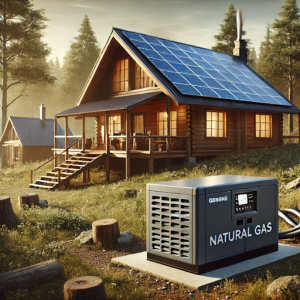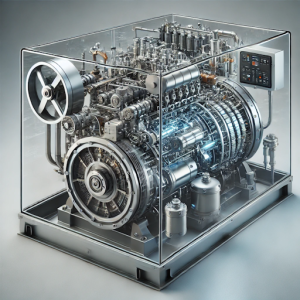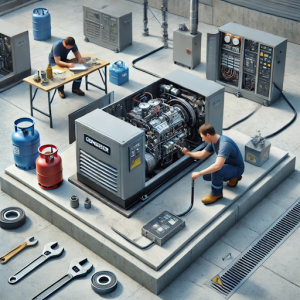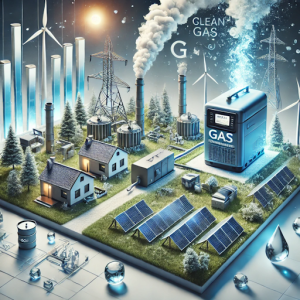Unlock the Benefits of Natural Gas Generators for Sustainable Off-Grid Living
Natural gas generators present an outstanding power solution for those seeking a reliable energy source for homes, cabins, or any off-grid setup. Understanding the various methods of power generation is vital for a successful off-grid lifestyle. The unique advantages of natural gas generators—including their consistent performance, economic benefits, and eco-friendly attributes—make them an attractive choice for off-grid enthusiasts committed to sustainability and energy efficiency. By opting for natural gas, you can confidently meet your energy needs while aligning with your environmental values, ensuring a responsible and effective energy strategy for your off-grid journey.
In an era where technology influences our daily lives, the concept of off-grid living has gained significant traction. Individuals are driven by various motivations, from the quest for sustainability to achieving a self-sufficient lifestyle. Disconnecting from conventional energy sources not only fosters independence but also promotes a fulfilling way of life. Off-grid energy solutions allow you to tap into renewable resources or alternative fuels, creating a comfortable living space that operates independently from traditional electricity networks and enhances your connection with nature.
To seamlessly integrate a natural gas generator into your off-grid lifestyle, it is essential to equip yourself with the right knowledge and preparation. This will ensure that your fundamental energy requirements are consistently met by a dependable power source. In this article, we will explore the various advantages of natural gas generators, clarify how they operate, and present key factors to consider when selecting and installing these systems to optimize your off-grid experience.
 Maximize Your Off-Grid Energy Strategy with Essential Insights
Maximize Your Off-Grid Energy Strategy with Essential Insights
- Utilizing off-grid power solutions liberates you from traditional energy networks, making them indispensable for remote living and during unforeseen outages.
- Natural gas generators provide a reliable and efficient energy output, contributing significantly lower emissions compared to diesel or gasoline alternatives.
- These generators function by combusting natural gas to produce mechanical energy, which is converted into electrical energy by a generator system, ensuring seamless operation.
- When choosing a natural gas generator, assess key factors such as power output, fuel efficiency, and maintenance requirements to ensure optimal performance and reliability.
- Proper installation and regular maintenance are crucial for the safe and efficient operation of your natural gas generator, ensuring longevity and performance.
Explore the Unique Advantages of Natural Gas Generators for Consistent Power Supply
One of the most significant features of natural gas generators is their exceptional reliability. By selecting a natural gas generator to fulfill your off-grid energy requirements, you gain confidence in a stable power supply tailored to your specific needs. Unlike solar panels or wind turbines, which can be influenced by weather fluctuations, natural gas generators deliver consistent energy output, ensuring you have power when it is most critical.
This reliability is especially crucial for individuals who depend on electricity for vital activities such as heating, refrigeration, or operating essential medical devices. Knowing that your generator will provide power whenever needed creates a sense of security and peace of mind. Additionally, natural gas generators can lead to significant cost savings compared to other energy options available on the market.
While the upfront investment may be higher than some alternative off-grid solutions, the long-term savings can be substantial. Natural gas tends to be more affordable than gasoline or diesel, resulting in reduced operational costs over time. Furthermore, the maintenance requirements for natural gas generators are generally less strenuous compared to other fuel types, allowing you to save both time and resources while enjoying a reliable energy supply.
 Delve into the Operational Mechanics of Natural Gas Generators
Delve into the Operational Mechanics of Natural Gas Generators
Natural gas generators operate by converting the chemical energy stored in natural gas into electrical energy through a combustion process. When the generator is activated, natural gas combines with air and ignites within the engine’s combustion chamber. This ignition creates high-pressure gases that drive the engine’s pistons, ultimately rotating the rotor of the generator and producing electricity.
This operational method showcases remarkable efficiency, as it is cleaner compared to other fossil fuel options. A key element of a natural gas generator is its fuel system, which typically features a regulator to control gas flow and ensure optimal performance. Modern natural gas generators are equipped with advanced capabilities, including automatic start/stop functionalities and remote monitoring features.
Such innovative enhancements greatly improve user convenience, empowering you to manage your power supply more effectively, thus enriching your off-grid lifestyle.
Essential Factors to Consider When Choosing Your Natural Gas Generator
| Consideration | Description |
|---|---|
| Power Output | Assess your generator’s required power output by considering the appliances and equipment you intend to operate. |
| Fuel Type | Opt for natural gas as your fuel choice due to its clean-burning and cost-effective nature. |
| Size and Portability | Select a generator size and level of portability that align with your space availability and mobility needs. |
| Noise Level | Evaluate the generator’s noise output to ensure it complies with acceptable standards for your living environment. |
| Start-up Mechanism | Choose either manual or automatic start-up options based on your convenience and usage frequency. |
When selecting a natural gas generator for your off-grid setup, it is crucial to consider several key factors. Start by evaluating your power requirements. Calculate the total wattage necessary to support your essential appliances and devices, ensuring that your chosen generator can effectively handle the load.
It is advisable to select a generator with a slightly higher capacity than your calculated needs to accommodate any sudden spikes in energy demand. Another important factor is the generator’s portability and installation requirements. If you plan to relocate your generator often or use it in various settings, look for a lightweight and easily transportable model.
Additionally, decide whether you prefer a stationary installation or a portable unit that offers flexible setup possibilities. Finally, consider the noise level of the generator; quieter models can greatly enhance your off-grid experience by minimizing disturbances and preserving the serenity of your natural surroundings.
 Best Practices for Installing and Maintaining Your Natural Gas Generator
Best Practices for Installing and Maintaining Your Natural Gas Generator
Installing a natural gas generator requires thorough planning and careful execution to guarantee both safety and efficiency. Begin by selecting an appropriate location for your generator that complies with local regulations and safety guidelines. Ideally, this site should be well-ventilated and distanced from any flammable materials, ensuring a safe operating environment.
You may need to construct a concrete pad or platform to stabilize and protect the generator from moisture and other environmental factors. After finalizing the location, connect the generator to your natural gas supply line. If you lack experience with gas line installations, it is wise to consult a professional to ensure adherence to safety standards and regulations.
Once the fuel connection is established, set up the necessary electrical connections to integrate the generator with your home’s electrical system. Regular maintenance is critical for ensuring your generator functions optimally. This includes routine checks on oil levels, air filter replacements, and spark plug inspections to maintain performance and reliability throughout its lifespan.
Cost Comparison: Analyzing Natural Gas Generators Against Other Off-Grid Power Options
When evaluating the costs associated with off-grid energy solutions, it is essential to conduct a thorough comparison between natural gas generators and alternative systems, such as solar panels and diesel generators. While solar energy systems are popular for their renewable benefits, they often require a significant initial investment for panels, batteries, and inverters. Additionally, solar systems may struggle to produce sufficient power on cloudy days or during the night without adequate battery storage solutions in place.
Conversely, diesel generators are known for their reliability but typically incur higher fuel expenses and more frequent maintenance compared to natural gas generators. Given the volatility of diesel fuel prices, natural gas often emerges as a more stable and economical choice in many regions. A comprehensive cost analysis reveals that natural gas generators generally provide a more affordable solution for individuals pursuing an off-grid lifestyle.
 Evaluating the Environmental Impact of Natural Gas Generators in Off-Grid Solutions
Evaluating the Environmental Impact of Natural Gas Generators in Off-Grid Solutions
As you explore your off-grid energy alternatives, it’s crucial to examine their environmental impact. Natural gas is often viewed as a cleaner option compared to other fossil fuels, such as coal or oil, due to its lower carbon emissions during the combustion process. By opting for a natural gas generator, you can significantly lower your carbon footprint while securing dependable power for your off-grid lifestyle.
Nonetheless, it’s important to acknowledge that natural gas remains a fossil fuel, and its extraction can have ecological implications. Methane leaks that occur during extraction and transportation present significant challenges concerning greenhouse gas emissions. To address these concerns, prioritize sourcing natural gas from reputable suppliers dedicated to sustainable practices and responsible extraction methods.
Furthermore, incorporating renewable energy sources in conjunction with your natural gas generator can further demonstrate your commitment to environmental sustainability and responsible energy usage, enhancing your overall off-grid experience.
Real-Life Examples of Successful Off-Grid Living with Natural Gas Generators
Examining real-world applications can provide valuable insights into how natural gas generators have been effectively integrated into off-grid living situations. For example, numerous rural homeowners have transitioned to using natural gas generators as their primary energy source after experiencing frequent outages with traditional utility services. This shift has enabled them to achieve energy independence while ensuring a steady electricity supply for essential functions like heating, cooling, and powering appliances.
Another illustrative case study involves remote cabins that depend on natural gas generators for seasonal use. Due to their remote locations, these cabins often lack access to standard power sources. Natural gas generators allow cabin owners to enjoy modern conveniences, such as refrigeration and lighting, without sacrificing their connection to the natural environment.
These success stories illustrate how natural gas generators can effectively support off-grid living, providing reliability and comfort. As you embark on your journey towards off-grid living, consider the comprehensive benefits that natural gas generators can offer. From their reliability and cost-effectiveness to their relatively low environmental impact, these generators can play a crucial role in achieving energy independence.
By carefully selecting the right model to meet your needs and adhering to best practices for installation and maintenance, you can smoothly transition to an off-grid lifestyle powered by natural gas.
Answers to Common Questions About Natural Gas Generators for Off-Grid Living
What defines a natural gas generator for off-grid applications?
A natural gas generator tailored for off-grid living is a power generation system that utilizes natural gas as a fuel source to produce electricity in remote locations where connection to the main power grid is limited or unavailable.
How does a natural gas generator function in off-grid scenarios?
A natural gas generator designed for off-grid use operates by combusting natural gas within an internal combustion engine. This combustion process generates mechanical energy, which is subsequently converted into electrical energy by a generator. The electricity produced can power various appliances, equipment, and lighting in off-grid environments, ensuring convenience and comfort.
What are the primary benefits of utilizing a natural gas generator in off-grid settings?
Key advantages of using a natural gas generator for off-grid living include:
– Lower fuel costs compared to diesel or gasoline generators
– Cleaner combustion resulting in reduced emissions
– Continuous fuel supply sourced from natural gas pipelines
– Lower maintenance requirements compared to other fuel types
What factors should be considered when using a natural gas generator for off-grid living?
Important considerations when employing a natural gas generator in off-grid scenarios include:
– Availability of natural gas supply in your area
– Initial installation and equipment costs
– Ongoing maintenance and servicing needs
– Environmental implications and compliance with emissions regulations
Is utilizing a natural gas generator off-grid practical for residential and commercial applications?
Natural gas generators designed for off-grid usage are suitable for both residential and commercial applications. They are widely employed in remote homes, cabins, farms, and small businesses that do not have access to the main power grid.
The post Natural Gas Generators for Off-Grid Power Solutions appeared first on Survival Bite.
The Article Natural Gas Generators: Your Off-Grid Power Solution Was Found On https://limitsofstrategy.com






You’ve captured the essence of why so many are turning to natural gas generators for off-grid living. For me, the appeal lies not only in their reliability but also in how they embrace a balance between modern convenience and eco-consciousness.
I appreciate your insights on the appeal of natural gas generators for off-grid living. It’s fascinating to see how people find ways to intertwine modern conveniences with an environmentally conscious lifestyle. Striking that balance can sometimes feel overwhelming, especially with so many options out there, but natural gas seems to hit a sweet spot for many.
You’ve really hit on something important about natural gas generators. I find the balance they offer between modern convenience and eco-consciousness fascinating as well. In our fast-paced world, it’s so easy to overlook how our choices impact the environment. Switching to natural gas can feel like a step towards more sustainable living while still enjoying the comforts we’ve come to rely on.